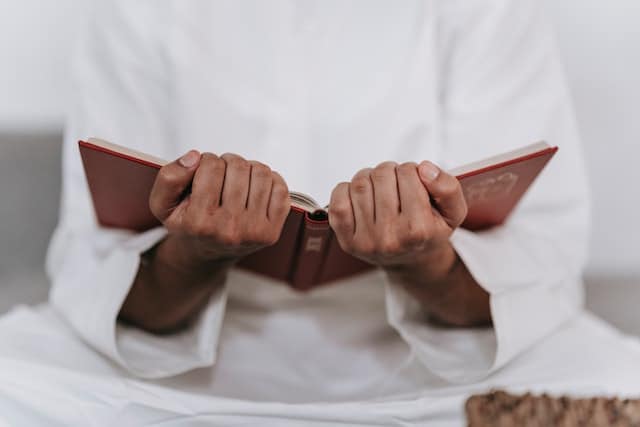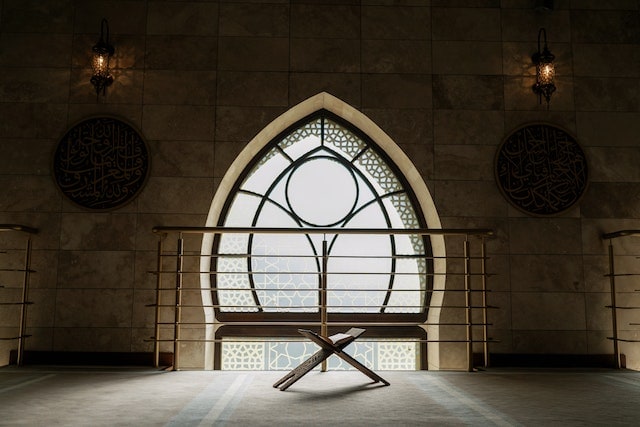
Muslim funeral traditions uphold a unique set of beliefs about death and dying. You may want to familiarise yourself with these practices if you are arranging or about to attend a Muslim funeral, or simply wish to learn more about their religious practices.
It is important to note that Muslim funeral traditions may differ based on the deceased’s sect within Islam or their family’s wishes.
Muslim Funeral Traditions
Ritual Washing
Before burial, a significant Muslim funeral tradition takes place, as the body of the deceased is washed with warm water and purified by individuals of the same gender, usually family members. This process is called ‘Ghusl’ and is carried out with utmost care and respect. It involves cleansing the body three times with the purpose of ridding the body of all impurities.
In the case of preparing a deceased Muslim woman for burial, her hair should be gently loosened, washed, and carefully combed. It is then braided into three separate braids and placed neatly behind her back.
Shrouding
After the ritual washing, the next Muslim funeral tradition to take place is the shrouding, as the deceased is respectfully wrapped in a modest shroud, known as a ‘kafan.’ This shroud is traditionally made from white cloth.
Muslim funeral services
Islam places a strong emphasis on burying the deceased as soon as possible, preferably within 24 hours after death. This practice reflects the Islamic belief that the departed soul should attain peace swiftly and without delay.
A Muslim funeral service will commonly be held at a mosque where the attendees gather in the courtyard, or a prayer room and it is customary for the deceased and all attendees to face the direction of Mecca, the holiest city in Islam.
A Muslim funeral service is typically short and considered a quiet and modest affair, therefore music, singing, and other forms of entertainment are avoided. Instead, the focus during Muslim funerals is on reciting prayers and reading from the Quran.
A significant part of a Muslim funeral is the Janazah prayer (Salat al-Janazah). This communal prayer is typically led by an Imam (Islamic prayer leader) or any knowledgeable member of the community. The attendees gather to pray, seeking forgiveness for the deceased and all departed Muslims.
Burial
Muslims must always be buried; the practice of cremation is strictly forbidden. The deceased’s body will be gently placed in a grave directed towards the Qibla (direction of the Kaaba, the sacred building at Mecca), with the body positioned on its right side facing Mecca.
Islam emphasises simplicity and modesty, therefore a decorative and extravagant tombstone over the burial site is prohibited. Instead, it is considered suitable to place a modest and simple marker or wreath on the grave as a means of acknowledging its location.

What to wear at a Muslim Funeral
Aim to dress modestly and respectfully. Both men and women are expected to wear simple clothing.
Avoid adornments
Attendees should refrain from wearing excessive jewellery or make-up, the focus is on simplicity, rather than drawing attention to oneself.
Shoes
It is customary to remove shoes before entering the prayer area. This Islamic practice is to maintain the cleanliness of the space and is considered a sign of respect.
Mourning colours
In some cultures, especially among South Asian Muslims, wearing white clothing is a sign of mourning. White is associated with purity and simplicity, which aligns with the sentiments expressed during times of grief.
However, this is not a universal practice among all Muslims. In other areas, it is common to wear dark colours like grey, brown, or black. Before deciding what to wear to a Muslim funeral, mourners should consider the customs of the specific community they are participating in.
It is common for non-Muslims to attend Islamic funerals and a great sign of respect, so if you are attending a Muslim funeral, be mindful of the diverse traditions and practices that are observed.
